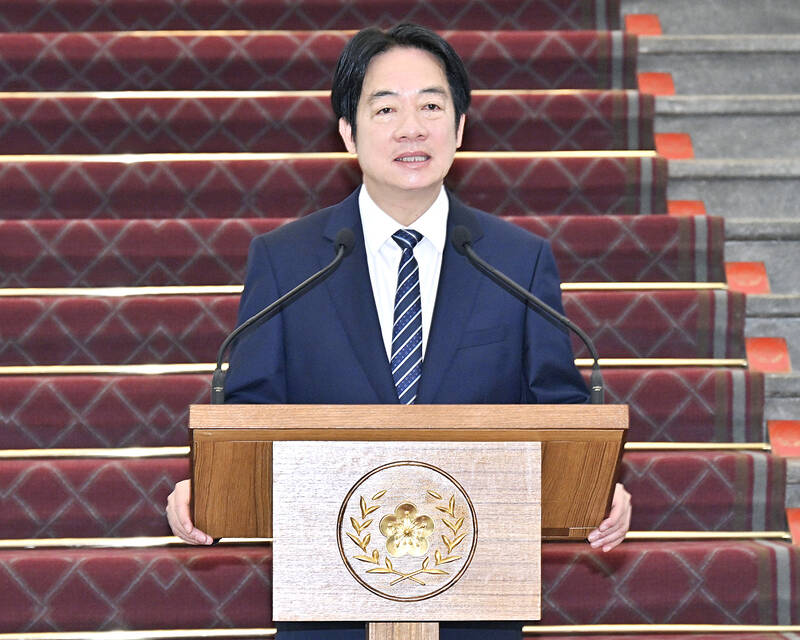President William Lai’s (賴清德) speech on the first anniversary of him taking office on Tuesday offered a vision of a “Taiwan of the world,” said David Keegan, former deputy director of the American Institute in Taiwan (AIT).
In an e-mail response to questions from the Central News Agency about the speech, which focused little on China, Keegan said Lai was describing a Taiwan “not defined by China or cross-Taiwan Strait tensions,” but focused on “advancing internal prosperity and social and political stability.”
“China only arises as a challenge to resilience,” said Keegan, an adjunct lecturer in the Chinese Studies Program at the Johns Hopkins School of Advanced International Studies.

Photo: Tu Chien-jung, Taipei Times
Yet the challenges posed by Beijing remain, and when asked if there was any way out of the strained ties across the Taiwan Strait, Keegan said: “I do not see any way to reduce cross-Strait tensions in the short run.”
However, he offered three ways to prevent the frosty ties from getting worse, although only one was in Taiwan’s hands — having Taiwan continue to strengthen its self-defense capabilities and resistance to “united front” threats.
The other two ways were up to China and the US — China reducing military activities around Taiwan, and the US and China easing trade tensions and resuming dialogue, Keegan said.
Regarding Lai’s remark about resolving “friction among friends,” which referred to the US threat of tariffs on goods imported from Taiwan, Keegan said Taiwan’s position had strengths and weaknesses.
Its role as a key partner in the information and communications field and artificial intelligence sector is an advantage, Keegan said, because the US wants to “advance quickly” in these areas.
“On the other hand, Taiwan has an existential need for US assistance to its security, which the US could exploit to win additional concessions,” he said.
Bonnie Glaser, managing director of Washington-based German Marshall Fund’s Indo-Pacific program, echoed Keegan and said Lai’s address was “appropriately focused on domestic issues,” as he has made his stance on cross-strait relations “clearly and firmly” in previous speeches.
Beijing has also made clear its “distrust” of Lai, and is “only interested in dialogue on its own terms,” which is “unacceptable” to Taipei, she said.
Despite these differing viewpoints, Glaser said she believes that “neither side seeks military conflict.”
On the tariff talks, Glaser said both Taiwan and the US are “negotiating in good faith and working toward mutually beneficial outcomes.”
However, she said that Taiwan was just one of several nations facing the same US tariff threat.
“The challenges that Taiwan faces in its tariff negotiations with Washington are similar to those faced by other countries,” she said.
Richard Bush, former chairman and managing director of the AIT, said Lai’s premise in thinking about the situation with China is that “Taiwan has not been the cause of these tensions.”
He sees it more as the result of Beijing’s “coercion without violence” policy since 2016.
“The implication is that if Beijing showed restraint, opportunities for coexistence would open up,” said Bush, a nonresident senior fellow in the Center for Asia Policy Studies at the Brookings Institution, a Washington-based think tank.

A small number of Taiwanese this year lost their citizenship rights after traveling in China and obtaining a one-time Chinese passport to cross the border into Russia, a source said today. The people signed up through Chinese travel agencies for tours of neighboring Russia with companies claiming they could obtain Russian visas and fast-track border clearance, the source said on condition of anonymity. The travelers were actually issued one-time-use Chinese passports, they said. Taiwanese are prohibited from holding a Chinese passport or household registration. If found to have a Chinese ID, they may lose their resident status under Article 9-1

Taiwanese were praised for their composure after a video filmed by Taiwanese tourists capturing the moment a magnitude 7.5 earthquake struck Japan’s Aomori Prefecture went viral on social media. The video shows a hotel room shaking violently amid Monday’s quake, with objects falling to the ground. Two Taiwanese began filming with their mobile phones, while two others held the sides of a TV to prevent it from falling. When the shaking stopped, the pair calmly took down the TV and laid it flat on a tatami mat, the video shows. The video also captured the group talking about the safety of their companions bathing

A classified Pentagon-produced, multiyear assessment — the Overmatch brief — highlighted unreported Chinese capabilities to destroy US military assets and identified US supply chain choke points, painting a disturbing picture of waning US military might, a New York Times editorial published on Monday said. US Secretary of Defense Pete Hegseth’s comments in November last year that “we lose every time” in Pentagon-conducted war games pitting the US against China further highlighted the uncertainty about the US’ capability to intervene in the event of a Chinese invasion of Taiwan. “It shows the Pentagon’s overreliance on expensive, vulnerable weapons as adversaries field cheap, technologically

Starting on Jan. 1, YouBike riders must have insurance to use the service, and a six-month trial of NT$5 coupons under certain conditions would be implemented to balance bike shortages, a joint statement from transportation departments across Taipei, New Taipei City and Taoyuan announced yesterday. The rental bike system operator said that coupons would be offered to riders to rent bikes from full stations, for riders who take out an electric-assisted bike from a full station, and for riders who return a bike to an empty station. All riders with YouBike accounts are automatically eligible for the program, and each membership account